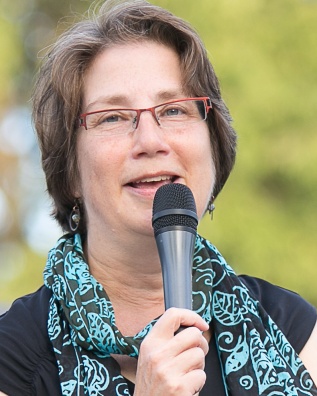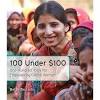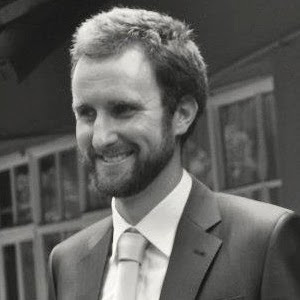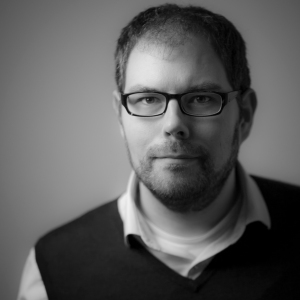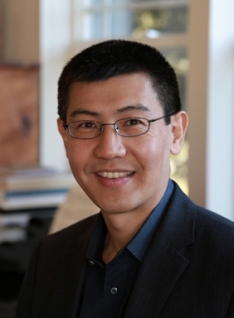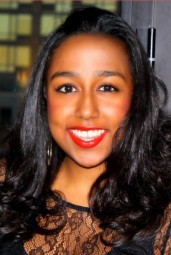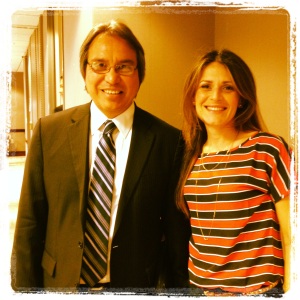
Gina Cosentino and UN Special Rapporteur Jim Anaya.
WHAT DO YOU DO?
I am a visiting scholar at the Institute for the Study of Human Rights at Columbia University. I am currently working on a paper assessing the study on extractive industries by Professor James Anayas, the former UN Special Rapporteur of the Indigenous Peoples Rights. I argue the regulatory framework he’s advanced should also be applied to the conservation sector. Conservation NGOs, like businesses, should have clear guidelines and principles that outline their responsibilities to respect the human rights of Indigenous peoples when working with, on, or near their territories.
I’ve been a conservation and human development practitioner for a while, so now I am taking time to get back to writing which is essential for advancing what I’ve learned and applying it more broadly. Being able to publish allows me to use my years of experience to contribute to shaping practices and ideas in this field. It’s a time to reflect on my work with Indigenous peoples, the various international and regional policy forums I’ve participated in, and other trends, opportunities and challenges.
My career and interests lie at the intersection of human rights, global development and conservation. My focus is on the questions we should be asking about how to ensure alignment with theory and practice for better compliance, accountability and inclusion. Over the last few years, I’ve been increasingly interested in how we can advance environmental conservation in a way which meets the needs of people such as achieving health goals, poverty alleviation, gender equity and so on. How do we put these goals together with innovative conservation programs that protect the environment and include people in a meaningful way too so we can help tackle some of the world’s most vexing global challenges?
Governments need to provide services for people and we need to demonstrate that by safeguarding and conserving forests or investing in wetlands, you can provide water for an entire city. As many of the world’s biologically important places are on Indigenous territories, it is essential to work with Indigenous peoples in a way that respects their rights to their lands, territories and natural resources and ensures tangible benefits of conservation that they want. In other words, going beyond environmental outcomes to benefit people as well.
This includes respecting and promoting the human rights of Indigenous peoples. They should be in the driver’s seat of conservation and development programs and not be merely responsive to what others want. Conservation and development organizations must invest in capacity-development, among other things, so Indigenous peoples can lead and be included at the decision-making table as equals with industry, global financial institutions, governments, conservation or development organizations.
HOW DID YOU GET TO WHERE YOU ARE?
I have always been interested in questions regarding citizenship. That is, how do we build a more inclusive society? How can a diversity of voices not only get to the table, but be heard and effect change? As a result, I studied constitutionalism and federalism and looked at ways in which different societies structure and organize diversity, respect human rights, and govern complex societies. Indigenous peoples in Canada as in other places in the world were excluded from nation-building. Their ways of life were either destroyed or devalued, they were pushed off their lands, etc. Indigenous peoples need to be included in decision-making and their inclusion is essential to good governance, sustainable livelihoods, and conflict reduction.
Throughout university I participated in events where I was exposed to Indigenous politics, which intersect with the very issues I work on today: global poverty reduction, environmentalism, equity, and social justice. I got to know key players and kept in touch. I also did a lot of volunteering, and pro bono work as the President of my own public affairs company. During graduate school, I became a course instructor as a way to earn extra money for my research and gain extra experience. Part of my studies took me to the United Nations when the UN Declaration on the Rights of Indigenous Peoples was being drafted. I first went as a researcher and then as part of Indigenous delegations when I was working with Indigenous organizations. Same thing goes for field research in Aotearoa/New Zealand and Australia where living in other countries allowed me to expand my network and my thinking. My graduate work really shaped how I think and work and had a profound impact on my career development and trajectory. I’m very lucky to be doing what I’ve studied and what I’m most passionate about. I have experience in different levels from community, to national, regional and international.
I worked for two national Indigenous organizations. First for the President of the Metis National Council and then for the National Chief of the Assembly of First Nations. That catalyzed my work within Canada at the national and international levels and yet, I had to remain rooted on the ground and remember that it is about creating positive and tangible change in the lives of people and communities and they need to be at the center of what we were doing nationally and internationally. Moving to Washington, DC from Canada to work at a leading international conservation NGO as a global leader in Indigenous conservation was a natural progression. I’m now more focused on combining conservation, human development and human rights. Of course, I’ve missed a few steps but those are some of my career highlights!
I also built an expansive and very diverse professional network. Networks are so important and help you bring a series of relationships wherever you go. It is important to respect your relationships by being trustworthy, keeping your word, and having integrity.
WHAT IS YOUR ADVICE TO OTHERS WHO ASPIRE TO BE IN YOUR FIELD?
- Be willing to take some risks outside your comfort zone… Students or young professionals often want go abroad to learn from communities in order to become an expert back home. Remember that you need to be humble; you will not have the answers. You need to check in on your opinions and be willing to let them go so new ones can be formed.
For example when working with Indigenous peoples, you have to EARN trust. They often see academics, scientists, development practitioners come in, they share their intellectual knowledge and then the specialists leave. Very little benefit is accrued to the community. Spend time in more than one country and in communities around you. Interning at various institutions in other countries can be good in this respect as you’ll be able to broaden your networks and gain valuable experience in working in different work cultures and styles.
2. Mix up your intellectual background ie political science, sociology, economics, biology, anthropology, etc. Multilinear thinking is essential in this business. No field has any one answer. You need to also think about how to ‘sell’ ideas – how to use new communication platforms effectively, how to influence for change and so on and this requires thinking about multiple strategies and tactics at once. In many respects, it’s extremely creative work.
3. Be thoughtful about the kind of conservation or development program you are developing. Spend time learning how the international system works, not just a specific regional or community focus. Look at all the things that could impact what you are doing -for example economic development, food security, and the environment. Understand your policy world in an integrated way. This goes back to multi-linear thinking. I can’t stress that enough!
4. Relationships take time and are based on trust. There’s no quick fix. It’s about getting to know others. Offer something that can be helpful to others but recognize when they are saying “no”. Also, it’s essential to not get caught up in the politics. Be trustworthy, honour your word, and deliver on your promises. The key to relationships is keeping them included and informed.
5. It’s not enough to work in a community. Know relevant international human rights norms and law before you go to a community. Know also where the government stands and the gap between international and national laws. It’s your obligation to ensure that what you do and how you do it is consistent with the highest standards and good practices in international law.
6. Ideally your time should be spent 1/3 in books, 1/3 in the field, and 1/3 to uniting those things together.
7. Read interesting news articles, documentaries, and academic scholarship so you can see how things are changing. Stay updated. Also read for pleasure. It’s amazing how you pick up new ideas and ways of thinking merely by picking up a book and allowing your mind to enter another universe!
This is an abridged version of an interview with Gina Cosentino.
